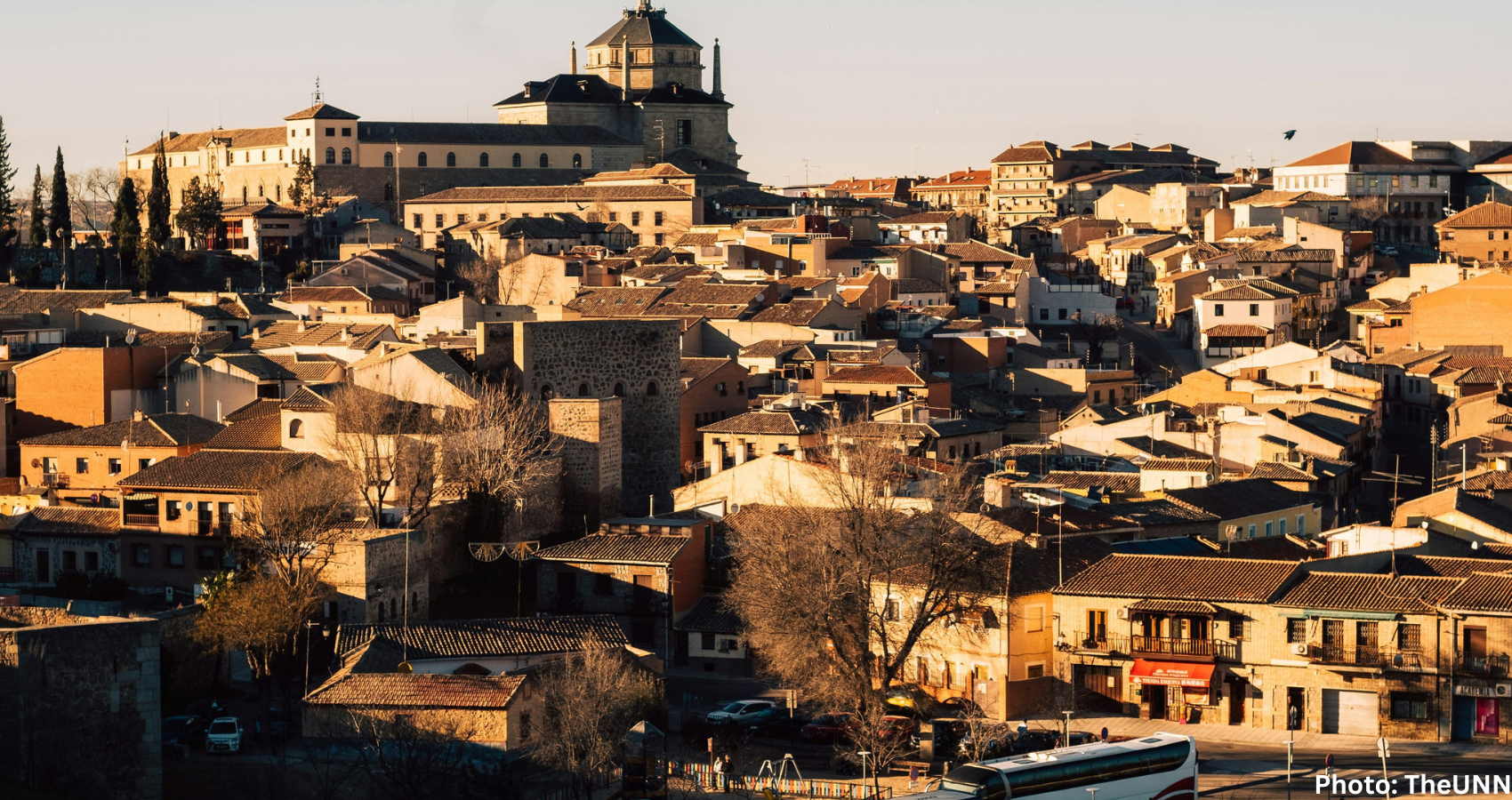This is the real world. This is the world that Mother knows.
She is inside her home. It is a two-story cottage in Toledo, a town of Castilla La Mancha. The town encircles a hill. The houses are egg-shell yellow or dove white and covered with brick-coloured roof tiles. Her home sits on the top of a lane curving up to the Alcázar.
Mother is in her bed, opening her eyes. She goes to the window and opens her curtains, seeing the hazy clouds and the Tagus river underneath, as well as the sharp green cliffs on the other side.
She had dreamt she was on top of a horse in Mongolia just now.
Su vida ahora tiene que ser la realidad. No es una ilusión.
She yawns and stretches, still in the pants and shirt she sleeps in. She goes for a shower, then gets herself ready to go downstairs.
As she passes the hallway into the kitchen, she notices someone right by the wooden table. It is her mother-in-law, sitting in her wheelchair. This is more and more of a sign that Mother cannot be in a dream. She remembers the day her mother-in-law was moved into her house. Was it a week ago? Was it two? Certainly, the way her husband and his two brothers had bickered, that could not have been an illusion. They had been shouting so loudly that she could hear them on the second floor while doing her prayers. When she came downstairs, their hands and arms were flailing in the air, gesticulating with passion their shared concern for their mother that had led each of them to a separate conclusion.
She must come home. She must stay with me. We will take care of her.
That was what her husband felt despite what his brothers had said. And so her mother-in-law was now staying at home with them as they tried to improve her medical state.
Mother tries to shake herself awake. Why is her mother-in-law downstairs by herself? There she is, sitting in her wheelchair, her mouth stuck in a smile, staring not at any person but deeply at the wall. Mother’s husband, Pedro, must have taken her in her wheelchair up and down the cobblestones to show her around the town before leaving to go to the hospital. It is only around six in the morning. Pedro must have left ten minutes ago. He trusts Mother to help him with the rest of his mother’s needs. This includes cleaning out her diaper, bathing her from head to toe, and feeding her by spoon the gazpacho or paella she makes for lunch.
This is not a dream. This is very much reality.
Mother suddenly shivers. She feels like she is in the middle of the tundra, but how can she feel this cold when she’s indoors and the heater is on? She feels like she has horse hair stuck to her pants, but when she picks it up, the hairs are grey and blond, clearly hers. She could have sworn she was in the middle of doing something, and it wasn’t cooking or cleaning.
I was about to realise something, and it was important…
« Oye… oye… ¿me escuchas?»
Is that her mother-in-law speaking? First of all, the dementia has been strong for the last year. If her mother-in-law speaks, which happens at random moments, it usually isn’t anything comprehensible, just a word here or there followed by a few sentences that don’t cohere to what was previously said.
The voice is also not coming from that side of the room. It’s almost like it is coming from somewhere underneath her. How is that possible? There is nothing below her other than the floor tiles they installed a few years ago…
« Oye… oye… ¿me escuchas? »
This is clearly a man’s voice. Mother is now scared. She reaches for the knife nearest to her, the one she normally uses to cut peaches and apples. The rough gesture frightens her mother-in-law, who gasps and looks about, as if she has been suddenly awoken from whatever dream world she was living in. What a beautiful thing, to live in a dream. Mother is almost jealous of her mother-in-law’s innocence, but only for a moment. Mother fears getting older and slowly losing her mind.
In a bid to console her mother-in-law, Mother comes to her side and tries to pat her arm.
« Suegra… no te asustas, por favor »
Her mother-in-law looks like she is about to cry. Teardrops are forming under her eyes. She is trying to lift a finger, like she is about to point somewhere behind Mother. She always does this regardless of what’s going on, but this time Mother wants to turn around. She brandishes the knife and faces the other side.
There is nothing. No one. It’s just the corridor that leads towards the living room, and a window facing the cliffs. Mother holds the knife firmly but considers putting it back on the table. She remembers she should be cutting some fruit for breakfast. It is difficult for her mother-in-law to chew apples, so Mother mashes them and feeds them to her mother-in-law via a spoon, like she would a little boy.
« Oye… you need to look below, not behind… »
Right on the tiles is the upper half of a man’s body. The man is wearing armour from the Medieval era. He has a sharp pointed goatee, and the two tips of his moustache curl upwards.
« ¿Quien eres tú? » Mother shouts. He cannot be human. His body is literally bifurcated by the floor. And yet when Mother stares firmly, she sees the rest of him. He is sitting up, lying on a bed, with the covers partially on top of him. He looks almost exactly like how Mother must look when she wakes up. Even the lower part of his body is in pyjamas, and the covers of his bed resemble hers.
« ¿Quien eres tú? » Mother asks again. « ¿And why are you on my bed? ¿How are you on my bed? ¿Who are you? »
« Tantas preguntas » the man complains. He rolls his eyes at Mother, then closes them, as if he would rather be sleeping. « I used to have all of these questions arise to me in my dreams. ¿Where is my Dulcinea? ¿What has happened to Sancho? ¿And who are you? ¿Who are you? Ultimately, it never mattered. I acted and made a lot of mistakes and embarrassed myself. And now here I am, lying here for eternity, known to the world as a fool. I just lie in bed and hide under the covers. If I had known back then that everything I believed in was an illusion, I would have never done what I did. »
Mother takes a few steps back. The fingers that are holding the knife are quivering. She has to concentrate to make sure she doesn’t drop it. Mother’s bottom lip wobbles.
The man carries on: « But then would I take it back? I acted as I did because I believed it. Belief is such a strong emotion. We do everything with the conviction that it is right, but most of the time, when we are in that state of mind, we do so much wrong. »
Mother would nod if she had the composure to do so. She sees a bit of herself in the man’s reflections, and the pit of feeling in the centre of her chest is aching, as what tends to happen whenever a truth is said and one is unprepared to deal with it.
« And yet the world is turning, the turns are turning. The world is like one giant windmill, and we are trying to catch on to it. »
The man laughs peculiarly, taking Mother out of the pain she is feeling. She now feels irate, annoyed, and confused. She wants to take the knife and cut the man right at the point where the tiles are reflecting the bed, to make the illusion dissipate like fog.
The man pulls at his moustache, twisting the hairs into an even finer upward curl. He looks at Mother and contracts his eyebrows.
« Life itself is a farce. We call something madness when we think it’s close to the odd, but in reality, being so fixed in how we should live life is a madness itself. What is wrong with dreaming? I lived my entire life as a dream, and the world made fun of me for it. And yet because I was willing to live this way, many others came after me and made a fool of themselves as well. People call such fools heroes. They make stories about them, they erect statues of them, they memorialise them, as time goes on and on. »
The man stifles a laugh, and then turns his eyes to meet Mother’s.
Mother turns away to face the wall, but the man’s half-body is coming out of the beige paint. Mother turns towards the kitchen, only the man is appearing out of the sink. Mother suddenly worries about her mother-in-law. Mother turns to face her, but she is facing the man instead, who is now sitting in the wheelchair, but also on the bed, as if it were an image pasted all around the wheelchair’s frames.
How is it that she can’t escape this man? He has become a part of everything she sees. She doesn’t have the time for this. It’s already getting late, the sun which was starting to rise is now full in the sky. She has to get on with washing and feeding her mother-in-law. If this apparition wasn’t disturbing her, she would have been in the midst of her prayers by now.
Mother closes her eyes and wishes, Dios, denounce this devil and leave me in peace.
She opens her eyes and sees he is still in front of her.
« You cannot get rid of me yet, dear. I am in front of you for a reason. I’m here to propose to you an adventure. It is an adventure far greater than the one I have undertaken. For though I have slayed many a knight and rescued many a damsel, it was only at the end of my journey that I realised anything about myself. You, my dear, have the gift of taking such a journey after countless others have tried and failed. You can start already knowing something a bit about yourself. You can start having already learned from our failures. And deep down, dear, you are far less in the fantasy than I ever was. I think you already know what you need to work on. »
The man touches Mother in the middle of her chest, and as if she is a pool stuck in stillness, she feels something inside of her ripple.
« You were dreaming for a reason. »
Mother looks at her mother-in-law, remembers the feeling of annoyance of having someone intrude on the schedule of her day. There are so many people and existences suffering on the planet, but Mother has not done anything for them. Mother has been extremely inactive. She wanders in her mind, she wanders in the four corners of her house. She has only lived her life while waiting for her life to end.
Perhaps she could use an adventure to take her closer to her destiny.
Mother suddenly imagines her son kissing another man, and her heart fills with disgust.
The man says:
« Do you want to leave this dream, to become disillusioned like I have? You have the chance to keep dreaming, to reach the heights I could only imagine reaching. »
Mother shakes her head.
The man smiles and extends his hand.



